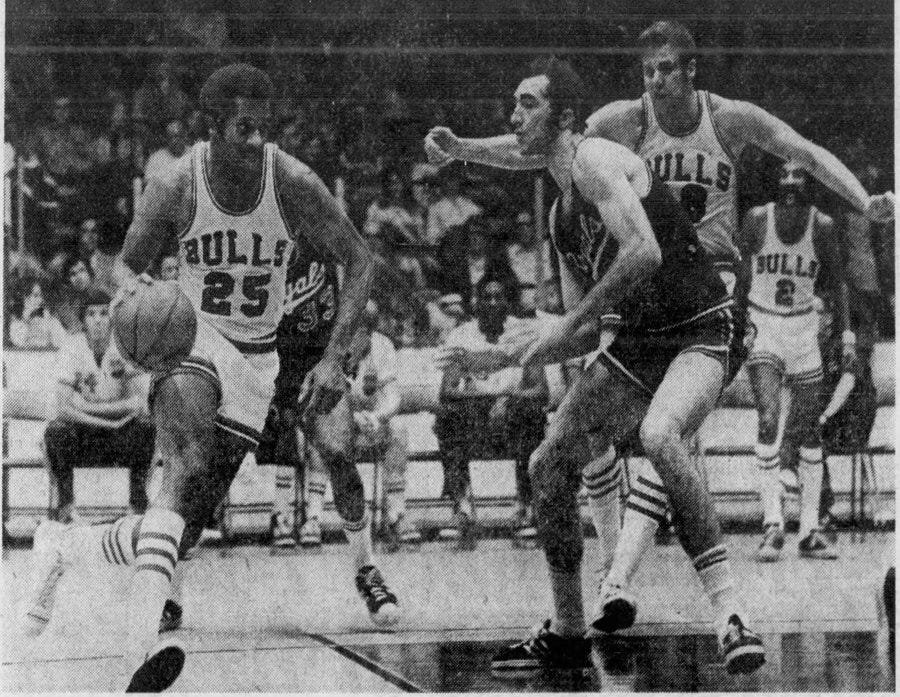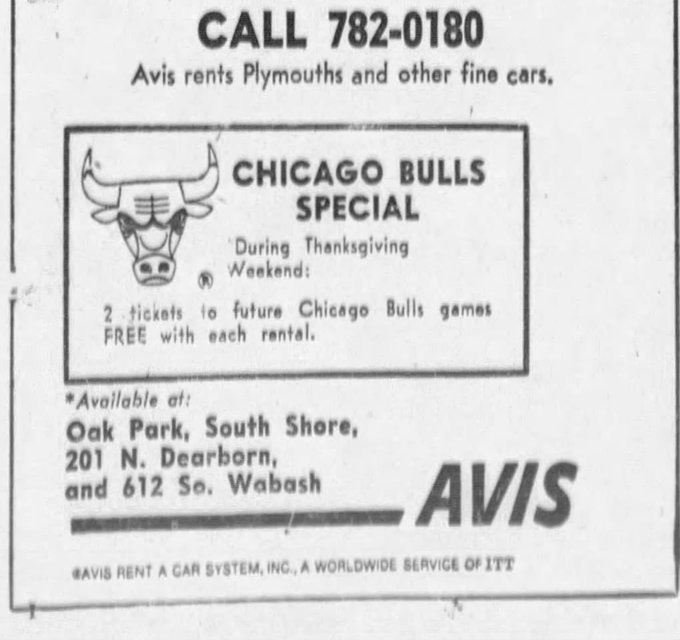The past arrives in pieces. “SLOAN 10” is alone in the rafters the first time you look. Norm Van Lier joins the broadcast. “LOVE 4” joins “SLOAN 10.”
You learn the players. The backcourt that, “You would have loved, Jack.” Mr. Bull and Stormin’ Norm. You learn other nicknames: Butterbean. The A-Train a bit later. And one that sounds so smooth you’re surprised it took so long to make it your way: Chet The Jet.
A scorer, a leader. The beloved tones and stories are reserved for his trio of teammates who were Bulls for life, more or less: Jerry Sloan, Bob Love, Norm Van Lier. But you could read between the lines and hear it — hear just how important this player was.
Chet Walker.
Few people leave a broad, lasting impact. Even fewer leave two.
Chet “The Jet” Walker was that rare type. His death on Saturday at age 84 has me thinking about what he meant to the game of basketball, on the court and off. On the court is simple. In his 13 NBA seasons, Walker starred on the premier iteration of one franchise and the best, for a time, of a second.
The first: the 1967 Philadelphia 76ers, the club that set an NBA wins record at 68-13 and bumped off the eight-time reigning champion Celtics en route to Wilt Chamberlain’s first championship. Wilt won his third MVP that year and Hal Greer was the team’s leading scorer in the playoffs and the Finals. Yet the closing moments belonged to someone else.
“When Coach Alex Hannum ran a ‘need play’ it was designed for Walker, not Chamberlain,” famed NBA writer and media man Peter Vecsey tweeted after Walker’s death. Chamberlain played with Greer and Billy Cunningham in Philly and of course Elgin Baylor and Jerry West in L.A.
And yet, as Chamberlain said: “Chet Walker was the greatest one-on-one player I've had the pleasure of seeing, playing with or against.”
Walker brought his repertoire of head fakes and clutch winners to Chicago for the 1970 season, immediately helping the Bulls reach the playoffs. More than his seven All-Star selections or 18.2 career points per game, perhaps Walker’s best stat is what he meant to his teams: in 13 NBA seasons his teams reached the playoffs every year.
The year before Walker came to Chicago, the Bulls were a disaster. They won just 33 games and missed the playoffs for the first time in their three-year existence, leading team founder and GM Dick Klein to be forced out by his fellow owners.
Klein had been trying to trade for Walker, a deal that finally came through when Walker’s 76ers let Pat Williams, their head of promotions, leave to replace Klein as Bulls GM and then finish the trade with his former employer1. The Bulls jumped up to 39 wins and made the playoffs, and had their first 50-win season the next year. They won a franchise best 57 games in 1972, 51 in 1973, 54 and a trip to the conference finals in 1974 and another conference finals in 1975.
Chet Walker retired and the Bulls won just 24 games.
“He belongs on the list of all-time money players,” Bulls scribe Bob Logan wrote about Walker in 19752. “It became harder over the years, because everybody knew who was going to take the payoff shot, but Chet took it and made it, or drew the foul, as often as Jerry West, Oscar Robertson or John Havlicek did for their squads.”

On Feb. 6, 1972, Walker set the new Bulls scoring record with 56 points, the only Bull to score 50 until MJ’s 63 in the ’86 Celtics.
“No, I never scored that many before,” Walker said later3. “It’s not good for one man to get that many points.”
“The man’s an artist,” head coach Dick Motta said after one sterling Jet performance in 1971, as great a compliment as one could get from Motta, whose surly approach to coaching was part of Walker’s motivation to leave the Bulls after 1975. Walker averaged 19.2 points per game in 1975 and dumped in 21 in the heartbreaking Western Conference Finals Game 7 loss to the eventual champion Warriors, yet he could not get a new contract in the NBA.
“I think I was blacklisted,” Walker told Sam Smith in 2007. His reasoning was his role as a named party in the 1970 lawsuit against the NBA to take down the reserve clause, and his follow-up suit in 1976 to gain free agency from the Bulls. Walker believed — and there was no reason to doubt him — that his participation in the suit not only ended his NBA career prematurely but kept him out of the Hall of Fame for much too long, as he finally made it in 2012, voted in by the Veterans Committee.
In January of this year, the Bulls elected Walker to their inaugural Ring of Honor class.
The 1970 lawsuit, Robertson vs. National Basketball Association, named for NBPA president and then-Royals union rep Oscar Robertson, was signed by the player reps for each of the 14 NBA teams, including Robertson and Walker4.
The suit blocked a possible NBA-ABA merger; owners wanted the merger because it would end the bidding wars between the leagues that were driving up salaries. Players obviously did not want to lose that leverage, their only leverage, considering that the reserve clause prevented players from leaving their teams as free agents. By suing the NBA, the union reps were fighting on behalf of all players — and all future players.
“The lawsuit changed the whole structure of the NBA,” Walker told Sam. “It took away all the power from the owners. The Robertson suit made possible all the money that’s made now.”
Six years earlier, Walker and Robertson were part of another legendary sports labor moment: the 1964 All-Star Game, when Robertson, NBPA president Tom Heinsohn, Bill Russell and others threatened to boycott the game hours before tipoff unless owners agreed to a pension plan.
“Owners were banging on the (locker room) door,” Walker said. “Elgin Baylor and Jerry West were being threatened with their careers — they’d never play again. We wouldn’t come out until they agreed to talk. Finally, the commissioner promised he’d discuss a pension plan.”
Those two moves — the ’64 pension boycott and the ’70 suit — helped create the standard of living that every NBA veteran enjoys now.
Walker was part of another groundbreaking collective that helped change history: the Motta Bulls.
The expansion Bulls made the playoffs in 1967, but won only 29 games in 1968 and got whipped in the playoffs by the Baylor-West Lakers. Founder and GM Klein brought in Motta as the new head coach in 1969, and the 33-win Bulls missed the playoffs, leading to Klein’s ouster.
New GM Pat Williams joined an organization whose fans, as Logan wrote, “were so weary of reading about constant bickering among Bulls’ owners, coaches, and players that they were ready to write off the National Basketball Association.”
Continued Logan:
“The feeling doubtless would have been mutual on the league’s part (…). Something drastic had to be done, especially after a disaster like 1968-69. Attendance sagged (…). Public confidence in the Bulls’ stability had sunk so low that Klein couldn’t find new backers to buy out his partners. Instead, they decided to get rid of him.”
How tough were times in the Bulls org? They routinely gave away tickets; one deal in 1970 gave fans two free Bulls tickets if they rented a car with Avis.
Relocation was not out of the question. In fact, it was fairly common. The Bulls were the NBA’s 10th team; five of the existing teams had relocated. One of them was the Baltimore Bullets, who just four years earlier had been the Chicago Zephyrs, the second NBA team to fail in Chicago. The Bulls were the third shot. There likely would not be a fourth.
Dick Klein, Dick Motta, Pat Williams and a special roster changed all that: Sloan, Van Lier, Love, Boerwinkle — and Chet the Jet Walker.
It’s not hyperbole to say that but for the Bulls of 1970 to 1975, the franchise could have been on the moving block. This team gave the franchise credibility, and Walker, with his championship ring and three All-Star appearances, gave this team its edge.
Ten years after Walker’s final season, the Bulls had Michael Jordan. Seven years later we had our first championship; no one could ever again question whether professional basketball would work in Chicago. During Jordan’s first retirement, free agency — which Walker fought for — brought us Ron Harper.
While he was our only real free agent splash in the dynasty, three key members of the dynasty owe free agency for their Bulls parting gifts. Jerry Reinsdorf and Jerry Krause hooked up Scottie Pippen, Luc Longley and Steve Kerr with lucrative sign-and-trade deals in which the free agency system and the Larry Bird Exception5 allowed Pip, Luc and Kerr to bag even bigger deals than they would have as free agents.
The Bird rule was the reason that Michael Jordan could sign the record-setting single-season deals in 1996 and 1997 that he had earned but would not otherwise have been able to secure.
“My heart, my soul, my love has always gone to the city of Chicago,” MJ said during the 1998 championship rally at Grant Park, “and no matter what happens, my heart, my soul, and my love will still be in the city of Chicago.”
Without Chet Walker, MJ’s heart, soul and love might have been someplace else.
-
-
-
Rest In Peace to Chet the Jet. Two excellent obits on Walker, from K.C. Johnson and Sam Smith.
Here is how Pat Williams described the trade in his 1997 book The Magic of Teamwork: “It turned out that Motta was ecstatic at the prospect of getting Walker. For months, he had been begging Bulls management to try to get Walker…(.) Dick knew that Walker’s style of basketball would provide exactly the spark and the chemistry his team needed to get off the ground. So my first official act as Bulls G.M. was to get the deal done (…). We went back to Chet’s place and talked to him. Actually, Dick did most of the talking. He spun a beautiful, glowing vision of building an entirely new team around Chet Walker.”
The Bulls and Chicago: A Stormy Affair — page 67
The player reps, along with Oscar and Walker, became known as the NBA 14: Bill Bradley, Knicks; Joe Caldwell, Hawks; Archie Clark; 76ers; Mel Counts, Lakers; John Havlicek, Celtics; Don Kojis, Rockets; Jon McGlocklin, Bucks; McCoy McLemore, Pistons; Tom Meschery, SuperSonics; Jeff Mullins, Warriors; Wes Unseld, Bullets; Dick Van Arsdale, Suns.





